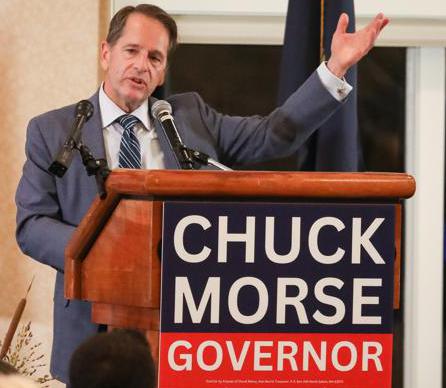
CONCORD, N.H. — Federal judges blocked the Trump administration’s efforts to crack down on diversity, equity, and inclusion in schools in April, but that hasn’t stopped politicians in New Hampshire from advancing similar anti-DEI efforts of their own.
Republican lawmakers have advanced a state-level plan to ban DEI and withhold funding from schools that fail to comply. Meanwhile, some conservatives have raised concerns about certain training materials, as they disagree with local school leaders over what “DEI’’ means.
The state-level ban would direct New Hampshire’s education commissioner to withhold all public funding from any public school the commissioner deems noncompliant, which critics say would give one official too much authority to interpret and enforce a vague and politically charged rule.
“That is not the New Hampshire way,’’ said Christina Pretorius, a progressive education justice advocate. “That is not how New Hampshire works, having that concentrated power. If that were to happen in any agency, it would be like fire alarms going off.’’
Republicans, who hold comfortable majorities in both legislative chambers, included the proposed DEI ban in the House-passed version of the state budget, which is now pending before the Senate. Those who support the sweeping state-level ban — which would apply to all executive branch agencies and every municipal government statewide — said they are aiming to curb waste and fulfill the public’s wishes.
“The people of New Hampshire do not want to be using their taxpayer dollars to subsidize or in any way pay for any trainings or programs or preferential treatment that puts somebody’s demographic information as the deciding factor in whether that individual is hired or chosen,’’ said Republican Representative Joseph F. Sweeney, deputy majority leader in the New Hampshire House. “We should be blind to any demographic data when it comes to workforce training or an initiative to hire people.’’
Beyond banning diversity quotas, this legislation would tell public schools they cannot “implement, promote, or otherwise engage in any DEI-related initiatives, programs, training, or policies.’’ The proposal says “DEI’’ refers to “any program, policy, training, or initiative that classifies individuals based on race, sex, ethnicity, or other group characteristics for the purpose of achieving demographic outcomes, rather than treating individuals equally under the law.’’
What exactly such a ban might mean in practice depends on who gets to interpret and enforce it, as evidenced by recent DEI disputes between state leaders and school administrators.
Victoria L. Sullivan, a first-term GOP state senator, complained publicly in late April about training materials at Manchester’s McLaughlin Middle School, where a packet intended to help teachers navigate dicey conversations was instead distributed directly to eighth-graders.
The packet included specific examples of racist stereotypes and microaggressions to avoid, such as telling an Asian person, “You’re all good at math,’’ or asking a Black person, “Why do you have to be so loud/animated?’’ It also featured an infographic conveying the idea that innate characteristics and cultural identifiers — such as skin color, gender, sexuality, ability, citizenship status, and wealth — have often been associated with relative degrees of societal power and privilege.
Sullivan, who declined The Boston Globe’s interview requests, posted photos of the materials online, released a statement, and voiced her objections on a talk radio show. She said the materials introduced children to harmful stereotypes about race and sex that would not have otherwise entered their minds, while causing white kids to feel guilty and minority kids to feel ashamed.
“This has infiltrated all of our society,’’ she said on the radio, “and in a place where we should be treating everybody equally, this does the exact opposite of that.’’
Jennifer Chmiel, superintendent of the Manchester School District, said the materials were intended to help teachers handle potentially wide-ranging reactions from students, but they were not written for students, so distributing them during state-mandated instruction on genocide and the Holocaust was inappropriate.
“That distribution was a mistake and should not have happened,’’ she said. “Nevertheless, it is false to suggest that the teacher intentionally sought to indoctrinate students with these materials.’’
Paulina Murton, executive director of the Great Schools Partnership, a nonprofit that provided the materials, said they were appropriate for their intended audience: teachers.
“Educators learning about how power and privilege show up in society is a critical component of the work to ensure that all students, regardless of identity or background, are treated fairly, feel a sense of belonging, and can have strong academic outcomes in their school,’’ she said.
Chmiel said the documents do not constitute “DEI materials.’’
Since the definition of “DEI’’ is so vague, even anti-bullying efforts have been caught in the fray.
In mid-March, outgoing Education Commissioner Frank Edelblut — a socially conservative former GOP gubernatorial candidate who has a track record of pressuring school districts and teachers to avoid certain books and classroom materials, while promoting anti-“woke’’ alternatives — called Everett Olsen, the school superintendent in Merrimack, N.H., and delivered what Olsen described as “a cautionary statement’’ about the risks of defying the Trump administration’s anti-DEI directives.
Republican Governor Kelly A. Ayotte has not yet named Edelblut’s successor.
Olsen, who formerly served as school superintendent in Westford, Mass., said local leaders at the Merrimack School District had noticed a troubling uptick in inappropriate comments among students, so they hired a consultant who specializes in training on diversity and cultural sensitivity.
“She is addressing bullying and harassment between students,’’ he said. “It is not DEI. It is not [Critical Race Theory].’’
Olsen said he has known the consultant for years, and her work with teachers and students has been appropriate and “tremendously valuable,’’ but a local resident raised questions and relayed concerns to the commissioner. Even though Edelblut didn’t explicitly ask him to halt the consultant’s work, Olsen said he decided to suspend the training until there is greater clarity from state and federal authorities about what is permissible.
When asked about the conversation with Olsen, a spokesperson for the New Hampshire Department of Education said Edelblut “regularly engages with constituents and school leaders statewide to discuss a wide range of issues.’’ Those communications “may also involve matters related to Title VI compliance,’’ the spokesperson said.
Title VI is a federal law that prohibits educational institutions that receive federal financial assistance from discriminating on the basis of race, color, or national origin. It’s also the law the Trump administration cited to claim DEI initiatives in education are already illegal.
While some states, including Massachusetts, sued to block enforcement of this anti-DEI interpretation, New Hampshire aligned with the Trump administration. Edelblut’s team directed local school leaders to certify their compliance, and the state published a running list of which districts had done so.
Nevertheless, several districts joined a lawsuit challenging the Trump administration’s orders, and the judge issued a preliminary injunction that applies both to the federal defendants and “any other person acting directly or indirectly in concert with them.’’
What impact the injunction might have on the New Hampshire Education Department remains unclear. Edelblut is expected to leave office this summer, and a spokesperson declined to say whether the injunction applies to the department.
This effort to purge certain ideas from New Hampshire classrooms echoes a still-pending legal dispute over the state’s 2021 “banned concepts’’ law, which drew inspiration from a “divisive concepts’’ executive order President Trump issued during his first term.
That law, which prohibited teaching that anyone is “inherently racist, sexist, or oppressive,’’ was struck down last year by a federal judge who deemed it too vague to pass constitutional muster, though an appeal is pending.
Steven Porter can be reached at steven.porter@globe.com.



